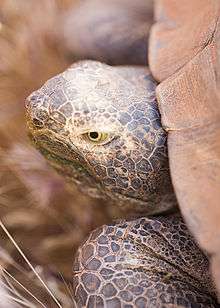Fernandina Island Galápagos tortoise
Chelonoidis phantasticus (commonly known as the Fernandina Island Galápagos tortoise or Narborough Island giant tortoise) is a species of Galápagos tortoise that was discovered in 1906 and not seen again until a single female was discovered living on Fernandina Island by an expedition in February 2019.[5][6][7]
| Fernandina Island Galápagos tortoise | |
|---|---|
 | |
| Holotype Chelonoidis phantastica adult male specimen, collected by Rollo H. Beck on April 5, 1906. | |
| Scientific classification | |
| Kingdom: | Animalia |
| Phylum: | Chordata |
| Class: | Reptilia |
| Order: | Testudines |
| Suborder: | Cryptodira |
| Superfamily: | Testudinoidea |
| Family: | Testudinidae |
| Genus: | Chelonoidis |
| Species: | C. phantasticus |
| Binomial name | |
| Chelonoidis phantasticus Rhodin et al., 2017[2] | |
| Synonyms | |
|
Testudo phantasticus Van Denburgh, 1907[3] | |
Taxonomy
Chelonoidis phantasticus is considered a member of the Chelonoidis nigra species complex, variably considered a subspecies of C. nigra or a valid species itself. Rhodin et al. (2010) lists them separately but under the heading "C. nigra species complex".[8]
Discovery and rediscovery
Originally known from only one male specimen found (and killed) by members of the 1906 California Academy of Sciences expedition, there were discoveries of putative tortoise droppings and cactus bite marks in 1964 and 2013, and an unconfirmed sighting in 2009.[1][9] However, no confirmed live tortoises nor remains were found on Fernandina until an expedition in February 2019 discovered an elderly female.[10] The expedition was led by Washington Tapia, director of the Giant Tortoise Restoration Initiative, and included four rangers—Jeffreys Malaga, Eduardo Vilema, Roberto Ballesteros, and Simon Villamar—plus Forrest Galante, a biologist with Animal Planet, which funded the expedition.[5] The tortoise has been transferred to a breeding center on the nearby island of Santa Cruz for the purpose of conservation and genetic tests. There are efforts being made to find a suitable male for Fern (the female) to breed with. [11][12][13]
References
- Rhodin, A.G.J.; Gibbs, J.P.; Cayot, L.J.; Kiester, A.R.; Tapia, W. (2017). "Chelonoidis phantasticus (errata version published in 2018)". IUCN Red List of Threatened Species. 2017. Retrieved 22 February 2019.
- Turtle Taxonomy Working Group; Rhodin, A.G.J.; Iverson, J.B.; Bour, R.; Fritz, U.; Georges, A.; Shaffer, H.B.; van Dijk, P.P. (2017). "Turtles of the World: Annotated Checklist and Atlas of Taxonomy, Synonymy, Distribution, and Conservation Status" (PDF). In Rhodin, A.G.J.; Iverson, J.B.; van Dijk, P.P.; Saumure, R.A.; Buhlmann, K.A.; Pritchard, P.C.H.; Mittermeier, R.A. (eds.). Conservation Biology of Freshwater Turtles and Tortoises: A Compilation Project of the IUCN/SSC Tortoise and Freshwater Turtle Specialist Group. Chelonian Research Monographs. 7 (8th ed.). pp. 1–292. doi:10.3854/crm.7.checklist.atlas.v8.2017. ISBN 978-1-5323-5026-9. Retrieved 14 October 2017.
- Van Denburgh, John (1907). "Preliminary descriptions of four new races of gigantic land tortoises from the Galapagos Islands". Proceedings of the California Academy of Sciences. 4th series. 1: 1–6.
- Iverson, J.B. (1992). A revised Checklist with Distribution Maps of the Turtles of the World. Richmond, Indiana: J.B. Iverson Pub. p. 363. ISBN 0961743115.
- Langlois, Jill (February 22, 2019). "How an 'extinct' tortoise was rediscovered after a century". National Geographic Society. Retrieved 2019-10-29.
- Godlewski, Nina (2019-02-21). "Tortoise thought to be extinct for a century found alive in Galapagos". Newsweek. Retrieved 2019-04-09.
- Stambaugh, Alex (21 February 2019). "'Extinct' Galapagos tortoise found after 100 years". CNN. Retrieved 22 February 2019.
- Rhodin, A.G.J.; van Dijk, P.P.; Iverson, J.B.; Shaffer, H.B. (2010). "Turtles of the World, 2010 Update: Annotated Checklist of Taxonomy, Synonymy, Distribution, and Conservation Status" (PDF). Chelonian Research Monographs. 5: 000.85–000.164. doi:10.3854/crm.5.000.checklist.v3.2010. ISBN 978-0965354097.
- Hendrickson, J.R. (1965). "Reptiles of the Galápagos". Pacific Discovery. 5 (18).
- "Tortuga considerada extinta hace 100 años es descubierta en Galápagos" (in Spanish). Retrieved 18 July 2020.
- "Marcelo Mata on Twitter". Retrieved 2019-02-20.
- "Not seen for 100 years, a rare Galápagos tortoise was considered all but extinct – until now". USA TODAY. Retrieved 2019-02-21.
- "Giant tortoise believed extinct for 100 years found in Galápagos". The Guardian. 21 February 2019. Retrieved 21 February 2019.

